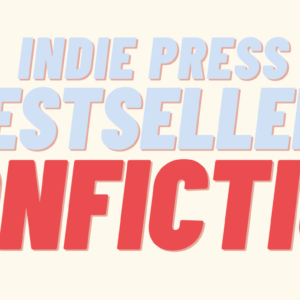
Elizabeth Wetmore and Kathryn Nuernberger on SB8, the History of Abortion, and Roe v. Wade in Danger
In Conversation with Whitney Terrell and V.V. Ganeshananthan on Fiction/Non/Fiction
Novelist Elizabeth Wetmore and essayist and poet Kathryn Nuernberger join hosts Whitney Terrell and V.V. Ganeshananthan to discuss Texas’s new abortion law. As the Lone Star State’s SB8 invites anyone to sue those “abetting” an abortion after six weeks of pregnancy, Roe v. Wade has never seemed more at risk. In this episode, Wetmore talks about the Southwest’s history of suppressing women’s rights to birth control and reads from her novel, Valentine, which takes place in Texas and depicts a cast of women struggling to navigate the aftermath of sexual violence and access to abortion in 1976. Then, Nuernberger reads from her essay collection, The Witch of Eye, and her poetry collection, RUE; she discusses midwives, witch trials, herbalism, torture, and how these subjects help us interpret the history of women’s reproductive rights.
Subscribe and download the episode, wherever you get your podcasts!
Check out video excerpts from our interviews at LitHub’s , Fiction/Non/Fiction’s YouTube Channel, and our website: https://www.fnfpodcast.net/. This podcast is produced by Anne Kniggendorf.
*
Selected readings:
Elizabeth Wetmore
Valentine · “Women and Horses (1976)”
Kathryn Nuernberger
The Witch of Eye · RUE · Brief Interviews with the Romantic Past · The End of Pink · Rag & Bone
Others
SB8 · “Abortion on the border: Legislation in Texas and criminalization in Chihuahua” by Veronica Martinez (La Verdad) and Victoria Rossi (El Paso Matters) · “Abortion on the border: Activists stay resilient” by Veronica Martinez (La Verdad) and Victoria Rossi (El Paso Matters) · “What It’s Like to Run a Planned Parenthood in Texas” by Olga Khazan (The Atlantic, 2016) · “Why I Violated Texas’s Extreme Abortion Ban” by Alan Braid (The Washington Post) · Interventions for Women by Angela Hume · Eve’s Herbs by John M. Riddle · The Book of Difficult Fruit by Kate Lebo · Regarding the Pain of Others by Susan Sontag · WTF, Texas? Lacy M. Johnson and Natalia Sylvester on Surviving the Recent Storm and Unraveling the Whitewashed Myth of Texas(Fiction/Non/Fiction Season 4, Episode 12)
*
Excerpt from a conversation
with Elizabeth Wetmore:
Whitney Terrell:You’ve been talking about the reality of Texas. There’s also the myth of Texas: that the oil industry and the landscape are the thing that’s famously supposed to be the source of Texas’ big independent streak, especially when it comes to government interference. Our last WTF Texas episode was about the power blackouts in Texas, which were in part caused by the state’s insistence on having a power grid that was separate from all the other power grids in the United States in order to avoid regulation. I genuinely and sincerely am curious how an effort to turn every Texas citizen into an abortion regulator fits with this ethic of independence. Can we talk specifically about how the law SB8 does that?
Elizabeth Wetmore: Yeah, absolutely. It’s a puzzle, isn’t it? What is unique about SB8 is the cruelty of it. I think we’ve seen a lot of that coming out of Texas in recent months. There seems to be a little edge of cruelty to everything, from the way people are being treated along the border to the anti-trans kids bills. [SB8] basically puts women in the position of being afraid to go to their priest or their pastor or their rabbi or their teacher or their neighbor. It turns everyone into an enemy.
WT: Specifically, in case listeners don’t know this, what the law is doing, the way it’s enforcing and ending abortion in Texas, is that it incentivizes people to report anyone who’s supposedly assisting in an abortion being carried out beyond six weeks. And if they successfully turn the person in they get ten thousand dollars.
EW: Right. And that’s a good argument for civil disobedience. I’ve been very heartened to hear a couple of clinics in recent days talking about how they’re going to start to perform abortions again, no matter what, and just let the chips fall where they may. I hope that people who’ve got money to sin [laughs] will do that, and help these clinics basically do the right thing, which is to act in defiance of this law. I think guys like Greg Abbott and Ken Paxton get a lot of mileage out of the idea that well intentioned, thoughtful people who want to do the right thing frequently show up to these fights with knives, whereas they bring guns. We want to follow the laws, we want to do the right thing, and that gets us every time. Because [Greg Abbott and Ken Paxton] don’t care. They don’t care if their own citizens die. They don’t care if poor women die of botched abortions. There’s no bottom.
But to get to your question of the kind of myth of the rugged individual, what I would say is that I think a lot of that has always been bluster and bullshit. The myth of the rugged individual has always, in Texas, only applied to a very small group of people. The great state of Texas has never encouraged the rugged independence of black women in Houston, for example. They’ve never encouraged the rugged independence of Latinas living along the border. They’ve never encouraged the rugged independence of poor white women living in far rural West Texas. So that sort of fetishizing of rugged independence is, I think, something that has always belonged to a very particular group of moneyed, white, mostly male Texans.
V.V. Ganeshananthan: So you’ve mentioned Greg Abbott a couple of times now. And I think you called Ken Paxton his merry psychopath sidekick, which is going to erase his name from my mind [laughs]. Greg Abbott said that he wanted to, and I’m quoting here, “eliminate rape” as he signed off on this. But that’s a very difficult task, especially in a culture that—as your novel shows—is designed to hide and obscure sexual violence. I remember growing up reading about Ann Richards. She was governor of Texas from ’91’ to ’95. How do we get from Ann Richards to Greg Abbott and his merry psychopath sidekick?
EW: It’s not just that it’s difficult to eliminate rape in Texas, it’s disingenuous: he doesn’t mean it, he doesn’t give a shit. He’s saying what he thinks he needs to say but he doesn’t care because the system is working very well for him and those with whom he surrounds himself. How would you eliminate rape in Texas? You would have to get rid of guys like Greg Abbott [laughs]. It’s disingenuous, and he has no interest in passing any real laws that would actually tighten rape restrictions. It sounds brutally unkind to a state that I love, but I don’t love the leadership; at the end of the day they just don’t care what happens to their people. And by ‘they’ I mean the autocrats who run the state. When people say ‘so Texas goes, so goes the rest of the United States,’ I think that’s not an unhelpful way to look at the state of Texas. Some of these anti-voting restrictions, for example—I know Whitney you’re in Missouri and y’all are eyeballing a similar law to the one that’s passed in Texas.
WT: Oh, yeah. We’re gonna do that.
EW: This idea of keeping people poor, of keeping them pregnant, sounds so old school and old-fashioned, but it’s very helpful at propping up a system that’s very good to a certain segment of the Texas population. To answer your question about Ann Richards; honestly, I think Ann Richards was a kind of brief, shining anomaly in a much larger overall trajectory that is Texas and Texas history. She was great. I wish that there’d been more like her. I think you could argue that the backlash to her was pretty significant.
*
V.V. Ganeshananthan: Silphium isn’t the only abortifacient you’ve wrote about, of course, because you’ve wrote about pennyroyal and others, and I wonder—and you’ve already spoken about the fact that these are not really in use anymore—how did you research these? This sounds like such a maze, and maybe also pretty fun.
Kathryn Nuernberger: It took me a long time to actually get those images I wanted since the witch trials were a dead end. If people are interested in knowing more, John Riddle’s Eve’s Herbs I ended up finding kind of late in the process and is a pretty comprehensive compendium. I would also recommend Kate Lebo’s book, The Book of Difficult Fruit. The chapter on juniper has a lot of really good resources. And one of the things she talks about that I really appreciate in that chapter—that has really been on my mind—is the ambivalence about the tradition of herbalism as it relates to this conversation, especially because I’m just very split [on the subject of herbalism].
I appreciate the way in which herbalism is often thinking ecologically about our bodies and our permeability to the ecosystems we live intertwined with. I also appreciate that it’s trying to resuscitate this oral tradition of women’s knowledge of medicine. [However,] I’m also really troubled about the ways in which [herbalism] gets really entangled with the anti-vax movement. You can sometimes see, especially where plant medicines come in the conversation about birth control, there’s still this love affair with the notion of the natural in ways that get really complicated.
[For example,] the love affair with the notion of the natural in terms of natural childbirth and avoiding pain medication; in the medieval period it was illegal to have pain relief during childbirth because the Bible says the reason that women have pain during childbirth is because of Eve’s fall from grace. And there are actually accounts of people being executed for having had whatever pain relief was available. So I feel skeptical about that. And also there’s even a suggestion that plant based abortion is somehow more natural than a surgical abortion, which seems very troubling to me considering how effective and safe surgical abortions are. And the plant ones aren’t being talked about very openly.
I was in a conversation with herbalists at one point, where I was asking about Queen Anne’s lace and rue and columbine and pennyroyal—as you already mentioned, Sugi—and I was asking about Queen Anne’s lace. I was like, so I’ve read these blogs and it seems like there’s a debate among herbalists about whether you take it like a morning after pill or whether you take it like contraception, and do you take it every day or just the two weeks when you’re ovulating—which then makes it kind of like the rhythm method. And also, when do you harvest the seeds? And also, do you have to chew the seeds to release the tannins? And is that disgusting or do you just swallow them with a glass of water? And how does it make your stomach feel?
I was asking all these questions and they were not in agreement—these two herbalists—on the answers, which, you know, reaffirmed my desire not to use this as my preferred birth control method. And then one of them was like, ‘Oh, yeah, and anyway, I got pregnant while I was using Queen Anne’s lace.’ She was saying that she was interested in experimenting with plants, and also, ‘It’s fine if I get pregnant right now,’ so she was not looking for a reliable method. She was just curious how the plants work, which is a little bit where herbalism is at, right? Well, anyways, I don’t want to enrage herbalists.
VVG:We do have a large number of herbalists among our listenership.
Whitney Terrell: I’ve never liked pissing off herbal Twitter. It’s a fucking shitshow over there.
VVG: [Laughing] I do love the idea that you started a rousing debate between these two herbalists as you were doing your research.
KN: Well, and then another herbalist shoved in, and we were flipping through plant books, and looking at Queen Anne’s lace.
WT: How many herbalists does it take to change a lightbulb?
KN: When this other herbalist, who’s older, says, ‘Oh, and that’s the plant that got me pregnant.’ I was like, ‘Oh my God, you have the worst birth control!’ But she had actually been unable to conceive for many years, and had started a new regimen with this other plant that was designed to treat some issues that I think might have been endometriosis or something. This plant apparently worked so well that at age, like, 43, she had a surprise baby.
VVG: Oh my goodness.
KN: Anyway, my whole takeaway was: I just really, really want Republicans to stop screwing with my birth control.
VVG: [laughing] All paths lead to that thought.
__________________________________
Transcribed by https://otter.ai. Condensed and edited by Hayden Baker.
Fiction Non Fiction
Hosted by Whitney Terrell and V.V. Ganeshananthan, Fiction/Non/Fiction interprets current events through the lens of literature, and features conversations with writers of all stripes, from novelists and poets to journalists and essayists.



















